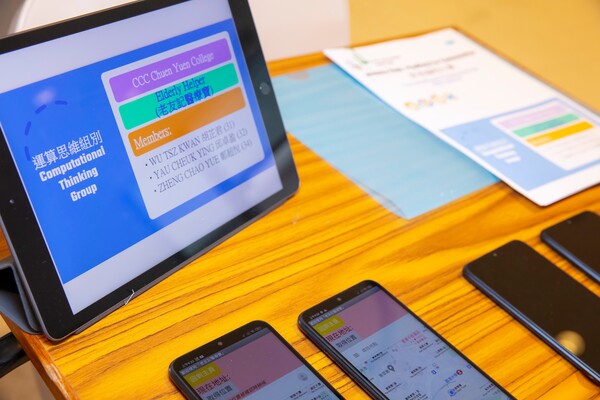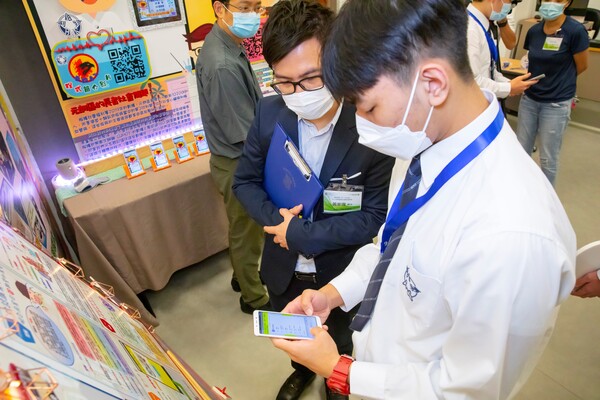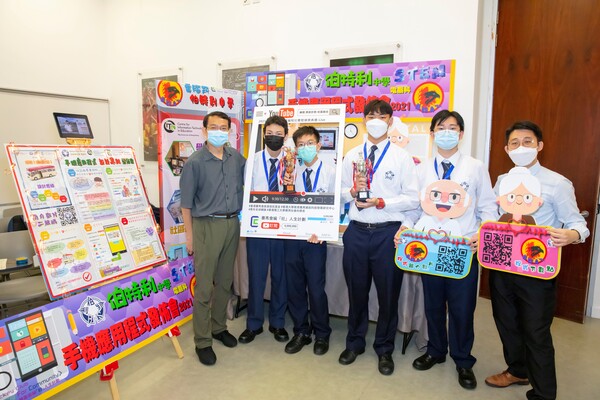The Code to Engaging Students
Teaching digital coding to students is a well-recognised way to improve their computational thinking and problem-solving skills. Dr Wong Ka Wai, Gary, Director of the Centre for Information Technology and Assistant Professor in the Academic Unit of Human Communication, Development, and Information Sciences at the Faculty of Education, HKU, has been leveraging those benefits to serve an even higher purpose – to give underprivileged students a sense of purpose and enjoyment from learning.
Working with the local non-profit organisation Youth Global Network and Dr Wu Qiaobing from The Hong Kong Polytechnic University, Dr Wong devised a Jockey Club Coding for Community Project (https://jc-codingforcommunity.cite.hku.hk) (the Project) that aims to deliver a coding curriculum to students in Secondary 2 and 3. He then paired students up with mentors to develop mobile apps that can serve people in their community.
This three-year Project, which received HK$12 million in funding from the Hong Kong Jockey Club (HKJC), is also the subject of research into how the experience impacted students beyond the technical aspects of creating a mobile app.
“Quite often, students think the knowledge they acquire is for performing well in examinations. But they seldom think about how to apply their knowledge and do something good for their own community,” Dr Wong said, “This is why we conducted our research to explore how this Project helped students develop better psychosocial attributes across different areas.”
The Project started in 2019 with seven pilot secondary schools as the focus of the research study (another 15 schools adopted the curriculum without the research aspect). A substantial number of students in the selected schools are from ethnic minorities, recently arrived from Mainland China, and/or from low-income families.
The participating schools agreed to substitute their computer lessons with those offered by Dr Wong’s team (because the government allows schools more flexibility in the computer curriculum). In Secondary 2 and the first term of Secondary 3, the students learnt coding and related skills to design a mobile app. They then spent the remainder of Secondary 3 working with their mentor to develop an app to be used by the community.
The mentors were all volunteers who were generally not computer experts but were familiar with the local community. Some were alumni of the schools where they mentor, some were connected to a local church, some were parents, while others were retirees. HKU students also acted as mentors when the schools were unable to find sufficient mentors (the target was one mentor to four or five students, so around 30 to 40 mentors were needed for each school).
“The job of a mentor is to go out into their community and look for stories and people who may need help, and then guide the students to think about how they can try to solve a problem with a mobile app,” Dr Wong said.
One example of the outcomes came from a group that designed an app to help low-income elderly people find cheap food in their community. The app provides them with the location of restaurants offering cheap or even free food (e.g. when a bakery is closing at the end of the day and trying to offload stock), and notifications will be sent to the users’ phones.
Dr Wong and his team were especially interested in how such achievements impacted the students. They conducted pre-project and post-project questionnaires, interviews with students and observations to obtain the answers, which were highly encouraging.
By the end of the second year, gaps were narrowed between students living in public housing and those who were better off, both in terms of their coding skills and their psychosocial development. The students’ psychosocial development was assessed through their perceived sense of hope, connectedness, grit, sense of community and resilience, while the latter two were found to be the most significant in the results.
“Students from diverse backgrounds saw a huge gap in their knowledge and skills, and didn’t find much hope for themselves at the beginning, but after going through this Project and knowing their skills can serve people in the community, they don’t think much about their socioeconomic status anymore. Now they are more aware of their contributions to the community,” Dr Wong said.
The researchers also looked specifically at the impact of mentoring. The Project involved 700 mentors with 15 hours of training in counselling and leading young people. However, during the COVID-19 pandemic, some students did not have mentors and had to work independently, while others could only meet their mentors online. Dr Wong said they found that meeting in person was the most beneficial approach. Students who were able to meet their mentors in person and go into the community to learn more about the issues and people’s needs showed better intrinsic motivation, resilience and self-efficacy.
“We thought students might prefer to stay home, but actually they favoured meeting others face-to-face. They loved going out and meeting people,” he said.
To further support students’ psychosocial development, schools were also asked not to burden them with assessments but instead to let them focus on the enjoyment of learning and using their coding skills to help the community. “We want the students to feel a sense of success in serving others with their knowledge,” Dr Wong said.
Dr Wong believes the Project may have also mitigated the effects of the pandemic, given reports from around the world of students losing their sense of hope and sense of community due to isolation. “The fact that students on the Project were not badly affected in these ways could be considered a sign of success,” he said. The first batch of students to complete the curriculum were celebrated last year at a special exhibition and prize-giving ceremony.
While the HKJC funding for the Project ended this summer, Dr Wong, who recently received the Faculty Knowledge Exchange Award 2022 based on this Project, said they would seek other sources to support it. In the meantime, he has received approval for a course for pre-service teachers in computational thinking, and he intended to continue to support schools, buoyed by the positive impact on students, affirmative feedback from teachers and mentors, and the opportunity to serve the community.
“My vision on the future of education is that it should focus more on the community rather than examinations and academic performance. Hopefully, students, whether through computational thinking or other problem-solving skills, can be engaged in collaborating for knowledge building for the future development of our society, and be involved more in the learning process. We want students to own their learning,” Dr Wong said.
Dr Gary Wong has worked with a local non-profit organisation and the academic sector to devise a programme to help secondary students develop mobile apps to serve the community’s needs.

A mobile app has been developed by students to help the elderly set reminders for taking their medicine, call for patient escort services, and find their way to the nearby clinic or hospital for medical appointments via voice recognition.


Students demonstrate the mobile apps they developed at a poster conference with the support of their school teachers and volunteer mentors.
